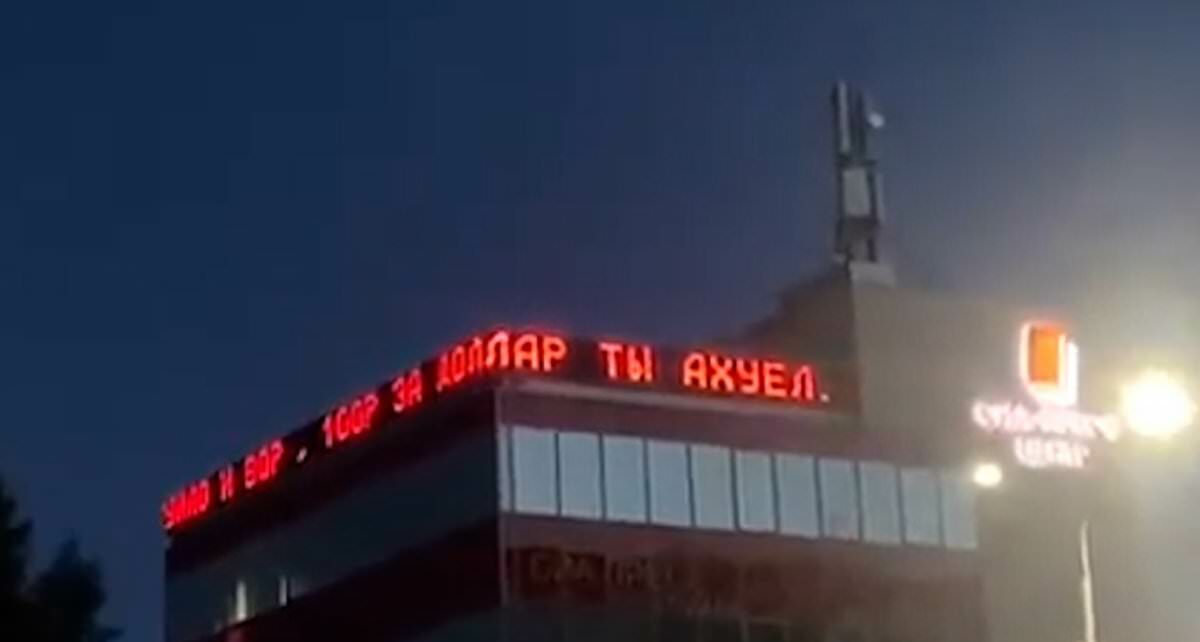‘Di**head’ Putin is mocked for the collapse of the rouble after pranksters hack electronic sign in Russia
- Policymakers convened yesterday as the rouble slumped to a dramatic low
‘Prankster hackers’ have branded Russian President Vladimir Putin a ‘di**head and a thief’, cracking an electronic news ticker in the Siberian city of Surgut to voice discontent with the rouble’s dismal performance.
Looping around an office building in the ‘Oil Capital of Russia’, a city of 400,000, the message made its frustration clear: ‘100 roubles to the dollar. You’re out of your f***ing mind.’
Russia’s currency has fallen to its lowest value in 17 months, part of a broader decline since early 2022 after a strong recovery post-pandemic.
The rouble’s performance has been hampered by sanctions slapped on Russia in response to the war in Ukraine, prompting an emergency meeting earlier today to discuss a rate rise.
It is not clear who was behind the ticker, but authorities have expanded laws to prohibit anti-war statements and clamp down on public dissent since the invasion last year.

An office building displays a crude message in Russian above the city of Surgat in Siberia

The Russian rouble was worth a cent on the dollar yesterday, prompting emergency talks
Since the war started, Russia has faced significant difficulties exporting commodities and insuring transportation.
Russia’s oil and gas sector, which accounts for about 40 per cent of its federal budget revenues, has been one of the hardest hit, with the EU banning the transport of Russian crude and petroleum products overseas.
While the West has elected not to sanction Russian food and fertiliser exports, Moscow says its key exports have been hampered by difficulty traders are facing processing Russian payments and obtaining vessels and insurance.
These difficulties have translated to the rouble falling significantly against the dollar, from 0.185 on June 24 last year to just 0.0102 at the time of writing.
Yesterday, it fell below the 0.01 mark, meaning it was worth less than a cent.
In an emergency meeting called earlier today, monetary policymakers in Russia raised interest rates by 3.5 points to 12% in a bid to maintain the currency’s value.
The announcement had ultimately little impact, and poses a challenge for Vladimir Putin as he continues to fuel the invasion of Ukraine.
In May, The Economist estimated that the war would set Russia back some 5trn roubles (then $67bn) each year, or about three per cent of GDP.
The toll is much less than the 61 per cent the USSR spent at its peak in World War II, but shadows, for example, the one per cent the US was willing to sink into the War in Iraq.
It also comes as Russia plans to double its 2023 defence spending target to more than $100bn, a third of all public expenditure, according to a government document revealed at the start of August.
Printing more money would drive up inflation, with potentially catastrophic consequences for citizens – and risking further undermining support for the war.
Reliable figures are hard to come by, with Russians unlikely to share their views for fear of punishment.
The Russian government detains individuals who publicly oppose the war and has censored online sources providing ‘unbiased’ information, according to the US embassy in Georgia.
Still, polls conducted by the Khroniki project suggest support for the invasion remains high in Russian regions closer to the front, averaging 60 per cent nationally.

Vladimir Putin (L) attends a meeting with the regional head of Inigushetia in Moscow’s Kremlin, on August 15, 2023

The second part of the message reads: ‘100 roubles to the dollar. You’re out of your f***ing mind.’
Surveys by three independent polling groups, shared by the Wilson Center, show support for the war in Russia rise in spring 2022, fall as the invaders made less ground in the summer and autumn, and then rise again slightly in early 2023.
However, the Wilson Center noted limitations to the polls, as every third respondent said they were afraid to talk about their attitude towards the actions of the country’s leadership.
They observed that Russian loyalists were also more likely to agree to be surveyed than regime opponents.
Source: Read Full Article
